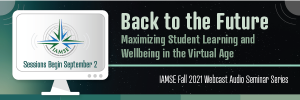
[The following notes were generated by Andrea Belovich, PhD.]
The opening seminar for the Fall 2021 IAMSE Web Seminar Series, “Back to the Future: Maximizing Student Learning and Wellbeing in the Virtual Age,” was presented on September 2nd, 2021 by Dr. Theresa Chan, Associate Professor and Associate Dean of Continuing Professional Development at McMaster University. In her presentation, entitled “Developing Faculty for the Future of Health Professions Education,” Dr. Chan provided an interactive digital workshop to empower the audience to think through what the future of medical education might look like, and sharing four major lessons her institution learned from digitally transforming their faculty development program.
Dr. Chan began by first explaining the principles of futurism and defined professional futurists as individuals who provide strategic foresight to help businesses and institutions survive the future. Audience members were able to scan a QR code during the presentation that linked to more information about the Association of Professional Futurists. Dr. Chan then explained the general process by which futurists navigate the uncertainty of the future. They begin by first framing the problem and determining its scope to identify its limits and domain. Next, futurists engage in scanning, which is exploring signals and indicators from other industries that experience evolutionary and market pressures to promote innovation to learn how others are adapting to change. The next step in the strategic process is futuring, which involves convergent/divergent thinking to identify the baseline and alternatives about how a current situation is likely to evolve and develop. Once the various possibilities are identified, the process of visioning allows an organization to develop its preferred version of the future that best fits its needs and beginning designs to implement it through prototyping. Finally, during the last step, adapting, the organization strategizes around alternatives and contingency plans.
Dr. Chan then discussed how this framework can be used in the context or responding to a disruption (such as the COVID-19 pandemic) and how to utilize such disruptions in an advantageous manner. She also noted that while many of these efforts began in 2014, the challenges and changes brought about by the COVID-19 pandemic served as a catalyst for the transition to digital faculty development resources, as distance learning and remote work became required. Dr. Chan then shared four significant lessons she and her institution learned as they digitally transformed their faculty development program the COVID-19 pandemic:
- The Digital Transformation of medical education and health professions education is achievable and desirable for many
- Growth orientation must be folded into every aspect of our organizations
- Social connection and networks are how we interface with the world
- Change is required. Educators need to be ready to make and lead change
While discussing these lessons, Dr. Chan provided several examples of the tools and resources McMaster University developed to support faculty development during a rapidly changing world. The majority of these resources are available to the public, and Dr. Chan extended an invitation to audience members to investigate and utilize these resources.